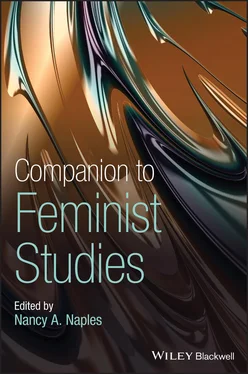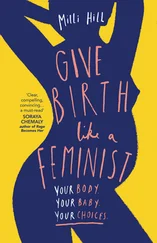In Chapter 5, Bronwyn Winter describes three different approaches to materialist feminism, which builds on Marxist feminism in different ways. They are each associated with different geographic constellations of academic knowledge: French materialist feminism, British materialist feminism, and US materialist feminism. As she explains, “Gender, and the relationship of male domination that underpins it, are historically constructed and grounded in social relations, and are thus not fixed, but open to interrogation and change.” They all center “the material (social, economic), structural and ideological rather than (only) discursive or cultural underpinnings of these social relations.”
In Chapter 6, Rose M. Brewer highlights the significant theoretical and activist insights of Black feminist and Womanist epistemologies. She notes that these interrelated formulations have a long history that, in the US context, dates back to at least the nineteenth century. Both approaches center Black women's experiences and social justice. Womanist thought foregrounds and features Black culture and spirituality. Black feminist thought marks the significance of the positionality of the social actor in reflecting on how the social and political world shapes individual and social experiences.
In Chapter 7, Patricia Hill Collins expands on the contributions of Black feminist thought and critical race theory in her discussion of intersectional theory which emphasizes the ways in which gender, class, and race intersect to shape different women's experiences and the social structures that them. Collins is one of the key theorists whose analysis of Black feminist thought (1990) was foundational for articulating intersectional theory and analysis. In Chapter 7, she presents the theoretical perceptions and social activism that informs intersectionality including a clear explication of legal scholar Kimberlé Crenshaw's founding formulation of the concept by offering “a shortcut that built on existing sensibilities in order to see interconnections” between gender and race. It also offers a framework for deepening analysis to incorporate sexuality, class, and other dimensions of difference and power inequality. Collins (2019) argues that given the importance of intersectional epistemology, it should become a central framing within contemporary “critical social theory that keeps critical analysis and social action in play” (p. 3).
Chapter 8explores the significance of the contributions to feminist epistemologies of “Queer, Trans and Transfeminist Theories.” Author Ute Bettray discusses the diverse origins and key premises of these interrelated approaches that theorize the fluidity of gender and sexuality, and challenge the binary and heteronormative approaches of other feminist frameworks. She concludes by discussing the ways in which transfeminism decouples feminine gender and female sex. She also emphasizes the significance of notions of queer space and time and deconstructive modes of queering “as a critical mode of the deconstruction of patriarchal, heteronormative, neoliberal late capitalism.” Bettray also examines transing as a process that “reveal[s] the socially constructed nature of categories and histories that can be reconceptualized in radically different ways.”
The final three chapters in Part II attend to the important insights drawn from the positionality of postcolonial, comparative, and transnational feminists. In Chapter 9, Umme Al‐wazedi explains that postcolonial feminism developed in reaction to the lack of attention to the dynamics of colonialism and empire in shaping postcolonial gender relations and global dimensions of inequalities, including “the hegemonic power established by indigenous men after the Empire.” Al‐wazedi argues that postcolonial feminism attends to the significance of caste, religion, and other dimensions of social, political, and cultural differences that shape the lives of non‐Western women.
In Chapter 10, Anne Sisson Runyan and coauthors compare approaches to feminism across different regions, which arose along with the expansion of regional governance and international non‐governmental organizations. Sisson et al. identify the resistance of activists and analyses of local conflicts, migrations, and economic shifts, as well as the diverse challenges and common themes in feminisms that are evident across regions. The authors highlight the importance of neoliberalism and the influence and resistance to Western feminism in shaping local feminisms that contribute to the “complex terrain of feminisms beyond binaries and borders.”
In the final chapter in this part ( Chapter 11), Gul Aldikacti Marshall defines transnational feminism “as a theory developed against white Western feminism's notion of global sisterhood, which assumes a common patriarchal oppression faced by all women.” Transnational feminism is a powerful framework that attends to both local expressions of feminism and resistance, as discussed in the previous chapter, and incorporates understandings developed in postcolonial feminist theory. It includes critique of neoliberal globalization, colonialism and imperialism as well as Western‐centric expressions of feminism. Marshall notes that transnational feminism allows for the possibility of “dialog and coalition building,” and solidarity among women in their contextual particularities that are based on the intersection of social locations, such as gender, race, ethnicity, class, and nationality.
In Part III, we focus on the diversity of methodologies developed by feminist scholars in response to the limits of approaches that rely on traditional positivist or androcentric scientific methods (see Chapter 12by Cynthia Deitch). Despite these critiques, feminist empiricist scholars continue to draw on positivist methods in the fields of demography, geography, economics and sociology to document the ways in which gender and other systems of difference and inequality are expressed in aggregate data. In Chapter 13, Gina Marie Longo details the premises and research strategies adopted by feminist empiricists who apply positivist approaches but also acknowledge the role of values in scientific research practices in order to minimize their negative effects. However, she also notes that feminist empiricism has been criticized for “lacking a radical approach to deconstructing the power hierarchies and systems of oppressions that exist within and are upheld by science.” Longo then presents two different feminist modes of knowledge generation: standpoint epistemology and postmodern feminism. Feminist standpoint analysis begins in the lived experience of socially located actors. They are especially attentive to the perspectives of marginalized knowers who experientially understand the “relations of power” ( Chapter 13) or “relations of ruling” (Smith 1989) that contour social life. In contrast, feminist empiricists focus on the diverse interests and values that are constructed as rational products of deliberative discourse, rather than an expression or reflection of lived experiences.
In addition to debates about what counts as knowledge and how to conduct research, contemporary interdisciplinary scholars ( Chapter 14) discuss the significance of the lack of women and women‐identified people working as scientists in academia and other research positions. They also consider more recent critical approaches which incorporate methodological strategies informed by postcolonial, critical race disability, and queer theories. Drawing on two contemporary case studies, Samantha M. Archer and A.E. Kohler demonstrate the power of feminist science studies to challenge some of the taken‐for‐granted findings of archeological and genetic research on gender to address “controversial bioethical dilemmas regarding intellectual disability and clinical practice.” In Chapter 15, Valeria Esquivel discusses how feminist economists contest “the gender‐blindness of economic thinking and have developed new analytical frameworks and methodologies to examine gender relations in economic institutions and economic functioning.”
Читать дальше












